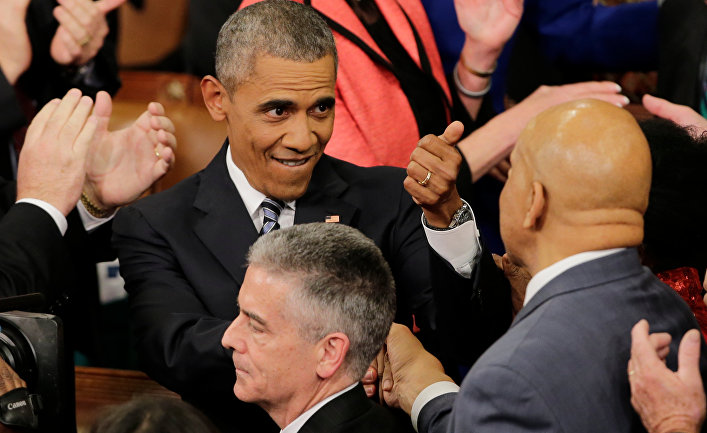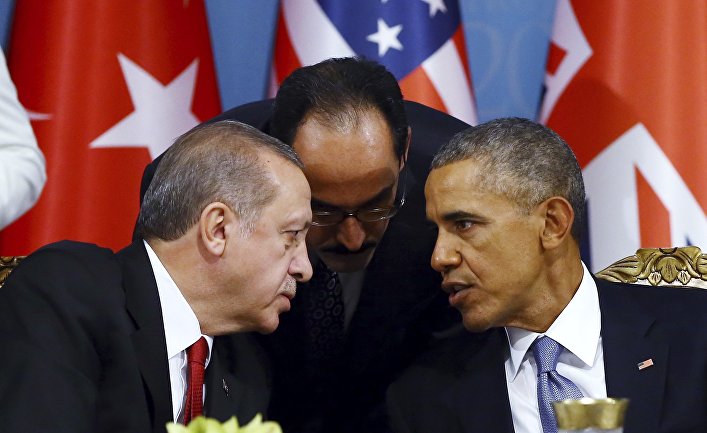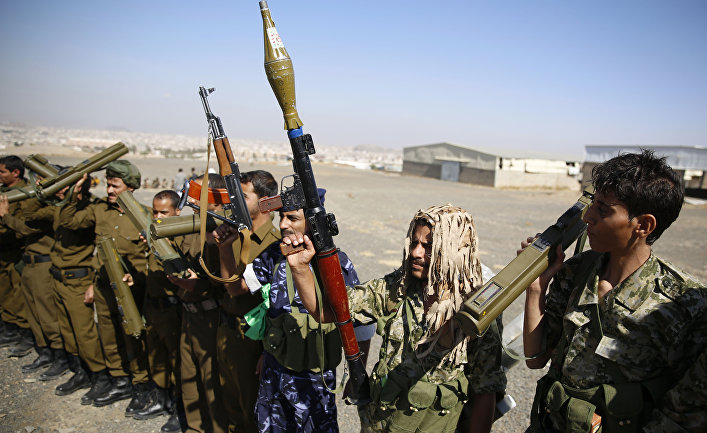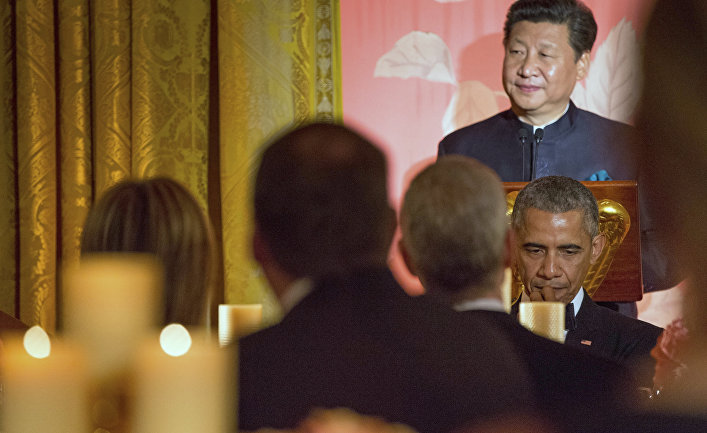The battle with worldwide terrorism
Despite the fact that the focus of the presidential campaigns during 2016 will be taken up by domestic policy issues, the decisions of the American leadership on foreign policy and security will nevertheless exercise considerable influence on domestic political affairs. American national security, primarily in the context of the threat from international terrorism will become one of the central planks of the presidential election battles in 2016. This topic would acquire even sharper relevance in the event of any fresh terrorist attacks undertaken in the US itself, or against American citizens located anywhere in the world.
The fallout from the terror attack in San Bernadino and the political debates which it provoked, showed that if any new terror attacks took place within the USA, the Obama administration could be harangued by American Republicans who feel that Obama has sat too long on the fence. Furthermore, any large-scale terror attack in the USA could provide the trigger for switching the presidential campaign focus from socio-economic issues to questions of national defense. This type of issue could influence the Obama administration's future policy on military action in the Middle East.
The situation in the Middle East
The Obama administration is implementing a raft of measures aimed at intensifying the struggle against the Islamic State (Daesh) within Iraq. However, it will not move to a 'ground' operation that requires any significant involvement of American troops. If no terror attacks are carried out against the US in America itself in 2016, which set off a domestic policy reverberance, then Obama's preference is to leave the issue of whether to up the military assault in the Middle East as a poisoned chalice for his presidential successor – particularly if it looks like a Republican may carry off the presidential race.
The biggest problems for Washington are the divisions among its coalition partners in the struggle against Daesh. Although in principle Washington backs Iraq in its differences with Turkey, the US may go ahead and back the idea of sovereignty for the Iraq-located section of Kurdistan. Despite Washington's loyalties to the Turkish leadership, the reality of these loyalties is taking a nosedive in practice. In 2016 the US, backed by its European partners, will up the pressure on Ankara to stiffen control of the Turkish-Syrian border, and limit its 'transparency' for militants. Any further terror attack in Europe could cause this aspect of America-European relations to worsen severely. Despite the fact that Washington succeeded in convincing Ankara of the need to pull its army out of Mosul, in 2016 Turkey's lackluster approach to sovereignty and the Iraqi border could pull the legs from under Recep Tayyip Erdogan's relationship with the Obama administration.
The US will continue to put a high level of political pressure on the official leadership in Syria – in part, recognizing the contribution of the Assad administration in the fight against Daesh and its status as the leading power in territories under its control. Even so, Washington will move to scupper any attempt to legitimize Assad's status through elections. Support for the USA and its allies will facilitate retention of the over-stated demands of the Syrian opposition during official talks with Damascus.

Officials in Washington will continue to deny the value of Russia's military contributions to the battle against Daesh on a political level, and will persist in mocking Russia's operations. However, behind the scenes, collaboration between military officials and special operations officers of both countries in the Middle East may grow more close. The limitations of Russo-American collaboration might instead be set by the US's unhappy coalition allies – primarily Turkey, along with Qatar, Saudi Arabia and Great Britain. Alongside this, the USA will refute any efforts to consolidate military successes scored by the Assad government and the Syrian army thanks to Russian support, or due to forces supporting Assad (such as the Syrian Kurds).
The US will provide both direct and indirect support to the Islamic Coalition which Saudi Arabia has formed – using it as a structure which can act in concert with the coalition headed by the US. The presence of the Islamic Coalition offers the USA the chance to lay off a considerable proportion of its risks and military involvement in the struggle against Daesh, while gaining collateral support in the Muslim world. Meanwhile it remains vital to the US that the American coalition isn't the only visible alternative to the grouping formed by Russia, Iran, Iraq and Syria.
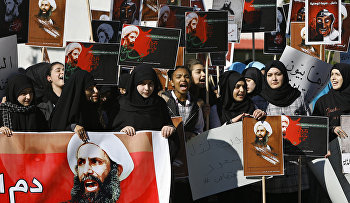
The results of adopting the comprehensive action plan reached with Tehran will be feeble. In the event of scheduled exports of highly-enriched nuclear fuels from Iran for storage or processing outside the country's borders, or any sales of heavy water, Washington's position on lifting its sanctions will be mitigated.
However, a raft of divisions on a wider range of issues – including the situation in Syria – could cause any sanction-lifting against Iran by the US or the international community to stall. Lobbying by US business itself has become a major stimulus for the gradual lifting of bans on US companies operating in Iran during 2016 – American companies don't want to miss the boat when Asian and European firms move in. Some of the most potent leverage against the USA's competitors could involve imposing sanctions on non-American multinational corporations who attempt to get into the Iranian market before the US and international restrictions are lifted.
The Asia-Pacific Region
A crucial issue for American foreign policy in the Asia-Pacific Region for 2016 remains the implementation of the Trans-Pacific Partnership (TPP). A lot will depend on the American domestic political situation in this matter – notably on how far Congress is ready to support the rolling-out of this initiative before the expiry of the available term – 90 days from the bill's presentation by the President.
If the TPP receives Congress's support in this way, then the USA will continue to implement the TPP in its broad form – not only as merely free-trade zones, but similarly as a trade zone with unified standards, principles of regulation in the trade and financial markets, as well as in the rights mechanisms for authorship rights and intellectual property. One of Washington's key foreign policy goals for 2016 is to achieve sign-up for the TPP by South Korea. With Japan successfully on board the TPP, the recruitment of South Korea would seriously stymie China's attempts to establish a free-trade zone encompassing the PRC, Japan and South Korea. China itself is in an even worse position than when the largest economy in South East Asia – Indonesia – agreed to adopt the TPP in October 2015 – thus threatening the development of a free-trade zone involving China and the ASEAN nations.
It's unlikely that Washington will devote much attention to the thorny issues of US-Chinese relations – primarily those considering territorial disputes in the South China Sea – nor even to the tussles between the PRC and America's allies (Japan) and partners in the Asia-Pacific Zone. However, the pace of development in Chinese militarization, and further growth in military expenditure, especially China's Navy and Air Force will provide Washington with a pretext to criticize Beijing's involvement and approach to key regional issues – in addition to accusations about Beijing's aspirations to dominance in the region. This kind of approach is money in the bank for the American military-industrial complex and its lobbyists. It gives the USA the chance for a double whammy against China on both economic and security issues.
Relations with the European Union and NATO
Throughout 2016 the US leadership will be focused on two main topics in its relations with the EU and NATO. The first is ensuring their non-military security. The second is tying up the loose ends of the Transatlantic Trade and Investment Partnership (TTIP). If Islamic terrorists succeed in committing further terror atrocities in the EU, then the USA will come under even more severe pressure from its European allies and partners. The chances for further such attacks in Europe in 2016 is extremely high. Thus the USA might, at any moment, come under severely negative reproaches from its allies – allies who are already berating the US for its unwillingness to come to their aid against terror threats. This will cause difficulties for the USA that will aggravate the existing discord between the USA and leading EU countries on the developing situation in the Middle East – particularly about what is going on in Syria and Iraq, and Russia's involvement in the scenario.
A huge opposition movement across Europe is forming against #TTIP. Join us in 2016! pic.twitter.com/IbJq2av0GF
— 38 Degrees (@38_degrees) January 15, 2016
In the face of all this, the US will take periodic opportunities to remind its allies of its willingness to provide military assistance to NATO-member countries – and underline the symbolic importance of cooperation with countries in Eastern Europe and the Baltics; the value of joint military exercises and other operations; yet in spite of all this, Washington's appetite for conventional military security for its allies is unlikely to grow. In this matter, much will depend on how political relationships go with Russia, and the pace of any political dialogue between Russia and NATO. Despite soured relations between Russia and Turkey, the US will act to limit Ankara's loose-cannon attempts to prize NATO into service in its conflicts with Moscow. There's nothing more than this that the US can do to promote rapprochement in the Russian-Turkish standoff. The Obama administration may even exert a calming influence on the outbursts of the Turkish leadership.
The US will be focusing all its efforts on Europe in the lead-up to the signing of the Transatlantic Trade and Investment Partnership (TTIP) agreement. This is a shibboleth for the Obama administration — to clinch the deal with the EU as the crowning moment of the Obama presidency. Regardless of the inherent problems which have stalked the negotiation process, especially over the issue of common standards, the chance to pull the agreement off remains – due to the residual authority left in the administration. Even so, it is hard to imagine that even if the agreement is ratified it might get pass Congress in 2016.
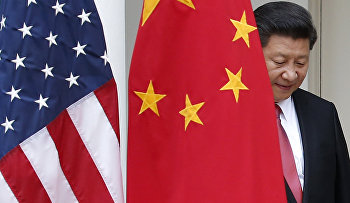
The Obama administration is strong-arming the EU to maintain its solidarity in operating sanctions against Russia – at least while Washington itself is enforcing them. Even so, a chorus of dissenting voices on this matter in Europe seems likely to upset the apple-cart between the EU and Washington. The appalling damage suffered by European business on this count can't be stacked up against the insignificant losses sanctions have cause for American companies – not even to begin counting the costs of the Russian countermeasures. All this is going to make a continuation of sectoral sanctions beyond autumn 2016 the cause for growing revolt among EU companies, with political consequences for the EU itself. Disobedience seems most likely to occur among countries whose economies are most closely associated with Russia's. Things will then move onto a transatlantic level. Even if the EU is unable to secure agreement on extended sanctions against Russian companies and banks, the US's favorite tactics of extraterritorial restrictive measures in trade and other areas, along with the deployment of both legal and other methods of putting the screws on other countries will result in substantial problems for European corporations and banks. When it comes to the question of purely political sanctions aimed at individuals and corporations, the US can be sure of the EU's continued loyal support.
Relations with Russia
Relations with Russia will continue to be one of the most contradictory aspects of American foreign policy. On one hand, Washington will not stint itself in the field of abrasive rhetoric against Moscow's activities or positions – nor in periodic venting about a list of favorite US bugbears about Russian-American relations generally. It's quite possible that Washington will wheel out another round of sanctions, designed to 'complement and build on the existing ones'. On the other hand, the Obama administration will want to make gradual reductions in the level of tension with Russia – employing more frequent tacit cooperation in specific fields, aimed at securing compromise in unimportant matters.
There are three topics of especial importance to America's relations with Russia in 2016:
- Security in Europe, with particular reference to the threat from terrorism
- The development of operations in Syria and Iraq, as well as the pace of opposition to ISIL and international terrorism
- the political and economic situation in Ukraine
On the first two of these issues there are prerequisites for a gradual improvement of communications between Russia and the USA/NATO – particularly if the risks to European security continue to increase. On the issue of Ukraine, hammering out compromises will depend not only on the positions and activities of Moscow and Washington — but on how far and how precariously the economic crisis in Ukraine looms, and how well the 'freeze' in military conflict in Donbas holds. In all of this, Russia and the USA would find it easier to achieve compromise through solving tactical and functional issues than by looking for strategic breakthroughs in relations. No such breakthroughs will be possible whilst Obama remains president – nor, in all likelihood, for 1-2 years after his presidency ends.
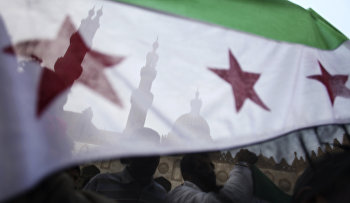
Should it happen that the US takes an interest in closer collaboration with Russia on all three of these crucial issues, then the success of Russia's military operations in Syria will become more clearly seen, the howls of protest from Europe's business and political establishment will grow louder – and there remains the chance that the Obama administration may choose, at last, to lift the sanctions which have been brought in by a sequence of presidential measures. Obama will not wish to leave the chance to normalize relations with Russia as a trump card for his incoming successor. The lifting of political sanctions against Russia and its companies is unthinkable for the next few years.
Yet Washington's policy will be based on an analysis of how far the Russian economy has been able to adapt to the pressure which sanctions have caused it. If Russia's economy shows no signs of recovery — the falling trends in world market prices for oil and gas continue, and the results of Russia's military operations in the Middle East flop — then the standpoint of the hardliners for increasing pressure on Russia still further is strengthened. Under their influence, the Obama administration could keep its entire program of debilitating measures against Russia in place, including the market-sector-based sanctions – with even a possible expansion of such sanctions. The actual situation in Ukraine here hasn't the slightest importance, although it might in some ways operate as a trigger.
An evaluation of the possibilities for the development of American foreign policy in 2016 – an excerpt from the annual forecast “Russia and the world – economics and foreign policy,” issued by the Primakov Institute of World Economics and International Relations of the Russian Academy of Sciences (IWEIR RAS), along with the RAS Centre for Situational Analysis.
